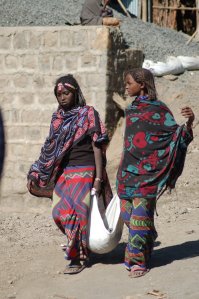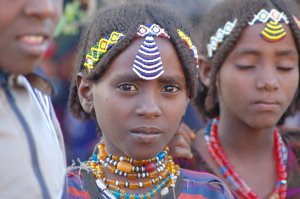 We had a visitor in our office yesterday. Ato G. from Ethiopia. A gentle yet bold man who’s responsible for the project we visited in the Afar district, where a water diversion project has transformed the community and dramatically increased the food security for hundreds (maybe even thousands) of people. He brought pictures and stories of lives transformed, new crops growing, and a bustling and growing village. When we were there in January, the people boasted that the village school which had had only 1 student 3 years earlier had grown to 64 students. Now, merely 8 months later, Ato G. tells us that it has now grown to 250 children, and 40 % of them are girls. Women have increasingly greater responsibility in the community, especially since it has been recognized that they possess many of the skills required to move the village forward economically.
We had a visitor in our office yesterday. Ato G. from Ethiopia. A gentle yet bold man who’s responsible for the project we visited in the Afar district, where a water diversion project has transformed the community and dramatically increased the food security for hundreds (maybe even thousands) of people. He brought pictures and stories of lives transformed, new crops growing, and a bustling and growing village. When we were there in January, the people boasted that the village school which had had only 1 student 3 years earlier had grown to 64 students. Now, merely 8 months later, Ato G. tells us that it has now grown to 250 children, and 40 % of them are girls. Women have increasingly greater responsibility in the community, especially since it has been recognized that they possess many of the skills required to move the village forward economically.
When we were there, we visited the second project that Ato G’s staff are overseeing. At least a hundred workers bustled around a busy work site carrying rocks, mixing concrete, hauling water, and digging trenches. He tells us that that water weir has now been completed and they are enjoying their first crops. There is renewed hope in the community. Access to water means access to life in arid regions like the Afar.
Ato G. came with some sad stories, however. Last year’s flood in the region set the communities back and meant that thick silt had to be removed from their new canals. We watched a man on a video tell us how he’d lost his farm when the flooding moved the river about 150 metres from the original riverbed. He stood looking over the rushing water and said “this used to be my farm.”
The piece of news that Ato G. brought that haunts me the most, however, is the story of the young girls. “Remember all the girls you watched carrying loads of rocks in their sacks to help build the water weir? They made up a large part of our work force there. But many of them are dead now.” Female genital mutilation. That’s what’s killing them. The community comes together for the coming of age celebration once a year or so, and with a single contaminated blade, 50 to 100 young women lose a little piece of themselves. In the weeks that follow, many of them lose their lives.
Female genital mutilation. That’s what’s killing them. The community comes together for the coming of age celebration once a year or so, and with a single contaminated blade, 50 to 100 young women lose a little piece of themselves. In the weeks that follow, many of them lose their lives.
I can’t get that out of my mind and my heart. We watched these young woman work. We watched them dance in the setting sun. We watched them walk their livestock home from the fields. We watched them cast subtle flirtatious glances at the young men – the same looks you’d catch in any country of the world when young people gather.
But many of them are dead now. And those that aren’t dead have been violated. And they’ve lost their friends.
Sometimes the work of international development feels like one step forward two steps back. The community has changed, they have access to water and more food. There are even woman serving in key roles in the community. That’s all good news. But their young women are dying.
Today I am sad for those hopeful young women who danced in the evening sun. My hope and prayer is that those who survived will rise up and be strong, and that some day, when it is their turn to step into whatever leadership roles they are afforded they will say “this is enough. We will not watch our daughters die.”
